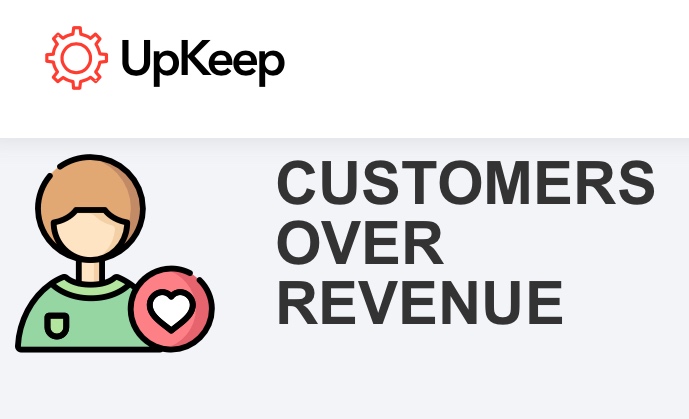The first time I read UpKeep’s company values, I was blown away!
And it was because they took an old tool from the “corporate strategy” toolbox and transformed it completely. It is quite a testimony on how to make your company values really tangible for everyone.
And they did it by changing the basic 6-word arrangement for 3 phrases comprised each of an interesting choice defined like “Grit over Prestige”. And is great!
Setting it up in a comparative fashion can make the core values of massive organizations really easy to grasp.
When the first one of those values is “Customers over Revenue” you know that there would not be a single moment at a single meeting that someone in your sales staff would even suggest to make a little more money over a customer being less satisfied.
It’s clever!
It’s like setting a framework that can guide your decisions on a daily basis. An algorithm ready to be executed. Or a protocol that must be followed no matter what.

And it’s also a virtuous circle because having values so easy to grasp definitely elevates the commitment and accountability of C-level executives that for no reason ever could choose for example “perfection” over “progress” if it’s explicitly stated behind you in the meeting room walls during that quarterly budget presentation where you’re pushing hard on your team.
But wait, my company has core values, I can see them on my office walls too, I even have them memorized: “Commitment, Communication..”
Yep, you’re right. In many companies the values are these great words like “Integrity” or “Collaboration”, but do those really create a framework? Do you think about those when you’re on that customer lunch? When you’re crafting a new contract for a new client? I don’t think so. And the reason is because we’re all supposed to be honest, or do respectful things. We are internally wired to believe that we have a good level of those “vitamins” like “loyalty” or “passion”. There’s no way to tell if you’re being enoughly “loyal”. Neither of those nice words would help us during the difficult choices of our important decision making journeys.
With the Upkeep model, everyone at every level can be sure that their decision is aligned with the company’s vision, because it’s easier to know if that Marketing Program that you’re designing is more focused on “Grit” or on “Prestige”. Or if you’re a developer, you can be confident that if you took you a whole weekend to work on learning different algorithms to predict failures instead of just picking one to deliver a ready to use product on Monday to not miss that deadline, you would not be punished, but instead you’d be rewarded! (“Progress over Perfection”)

I’d wish I could see this methodology of corporate strategy more often in those stale “About us” pages. But I guess that not everyone has Ryan’s ability to take old tools like the “values” and transform them into beautiful actionable shiny new gear to Upkeep the organization from within.
RC

